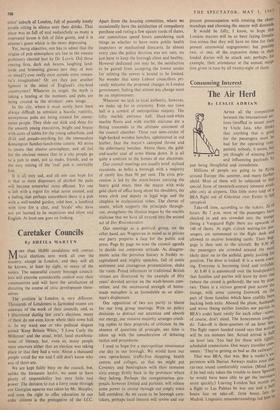Caretaker Councils
By SHEILA MARTYN
MORE than 10,000 candidates will contest local elections next week all over the country, except in London, and they will all be known, at least by sight, to many of the voters. The successful county borough council- lors will exercise considerable control over their communities and will have the satisfaction of directing the course of civic development them- selves.
The position in London is very different. Thousands of Londoners in furnished rooms are unaware of the work of their councils, and, as I discovered during last year's elections, many of them do not even know where their town hall is. In my ward one or two political slogans joined 'Keep Britain White,' I Love Curly the Milkman' and the usual, brief, local manifesta- tions of literacy, but, even so, many people were unaware either that an election was taking place or that they had a vote. About a thousand people voted for me and I still don't know who any of them are.
We are kept fairly busy on the council, but, unlike the fortunate harlot, we seem to have plenty of responsibility but very little real power. The decision to run a lorry route through our Georgian squares was taken by Mr. Marples, and even the right to offer education to our older citizens is the prerogative of the LCC. Apart from the housing committee, where we occasionally have the satisfaction of compulsory purchase and razing a few square yards of slums, our committees spend hours considering such things as whether to have more public health inspectors or mechanised dustcarts. In almost every case the policy decision was not ours, we just have to keep the borough clean and healthy. However dedicated one may be, the satisfaction to be gained from accepting the lowest tender for relining the sewers is bound to be limited. No wonder that some Labour councillors pri- vately welcome the proposed changes in London government, feeling that almost any change must be an improvement.
Whatever we lack in local authority, however, we make up for in ceremony. Even our town hall is a symbol of metropolitan majesty. The lofty marble entrance hall, black-and-white marble floors and wide marble staircase are a fitting crescendo to the ultimate statement of the council chamber. Three vast semi-circles of high-backed wooden benches, upholstered in red leather, face the mayor's canopied throne and the aldermanic benches. Above them, the gold- and-scarlet coat of arms blazes down. It is all quite a contrast to the homes of our electorate.
Our council meetings are usually brief, stylised occasions, as befits a borough with a majority of rarely less than 90 per cent. The civic pro- cession is led by the mace-bearer carrying the heavy gold mace, then the mayor with wide gold chain of office hung about his shoulders, the town clerk and deputy in legal wigs and the chaplain in ecclesiastical robes. The chorus of assent, which supports the principals through out, strengthens the illusion begun by the marble staircase that we have all strayed into the second act of Der Rosenkavalier.
Our meetings as a political group, on the other hand, are Wagnerian in mood as in private our party prepares a face for the public and, press. Page by page we scan the council agenda to decide our corporate attitude. As disagree- ments arise the previous history is freshly re- capitulated and mighty speeches, full of noble sentiment and courageous pronunciation, shake the room. Proud references to traditional British virtues are illustrated by the example of fifty years' devoted service on the wash-houses com- mittee, and the uncensored strength of home- made metaphor is as formidable as an alder- man's displeasure.
Our opposition' of two are partly to blame for our long group meetings. With no policy decisions to distract our attention and absorb our energy, our massive majority arranges crush- ing replies to their pinpricks of criticism. In the absence of questions of principle, our time is taken up with the consideration of debating tactics and procedures.
I used to hope for a metropolitan renaissance one day in our borough. We would have our own opera-house, traffic-free shopping, health centres and colleges, so that we might put Coventry and Nottingham with their immense civic energy firmly back in the provinces where they belong. Perhaps the reorganisation. pro- posals, however limited and partisan, will release some power to course through our empty town hall corridors. As we cease to be borough care- takers, perhaps local interest will revive and our present preoccupation with rotating the chair- manships and choosing the mayor will diminish. It would be folly, I know, to hope that London mayors will be so busy laying founda- tion stones that they will have no time for their present ceremonial engagements; but possiblY two, or one, of the expensive dates in their loaded diaries will be struck out; perhaps, for example, their attendance at the annual recer tion given in turn by all twenty-eight of them.






































 Previous page
Previous page